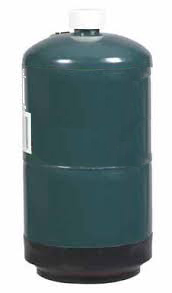How to Dispose of a Propane Tank
Propane tanks, also called propane cylinders, are commonly used to fuel stoves, grills, and water heaters. If your propane tank becomes old or broken, you may realize that you’re unsure of how to safely dispose of them.
First, what is propane? Propane is similar to natural gas because it’s a clean-burning fuel that doesn’t produce carbon dioxide or other harmful emissions. It’s non-toxic and will not contaminate groundwater or natural habitats.


Propane gas is stored in its liquid form inside of tanks. Tanks come in many different sizes, from household to industrial use. The most common tanks are 16.4 oz. containers, for small equipment like camp stoves, and 5 lb. steel tanks, for items like grills and outdoor fireplaces. Because propane gas has the ability to expand when heated, the tanks are never filled to the brim. They’re usually only filled to about 80% of capacity to allow for some wiggle-room. At most, a 5-gallon tank will contain about 4 gallons of propane.
Propane Tank Safety
Safety is a number one priority when handling propane tanks. The tanks must be a light or reflective color so that they reflect the sun’s heat instead of absorbing it. If the tank heats up, the volume of the propane expands and creates higher pressure. This may cause the safety relief valve to open, dangerously releasing all of the propane into the air. Additionally, watch out for rust developing on your propane tanks because it will eat away at the surface and cause the tank to heat up more. (Propane 101).
Propane Tank Disposal
Propane tanks are made out of recyclable steel and copper. But due to the gas and pressure inside, these tanks cannot be recycled with your other curbside recycling or thrown in the garbage. If any gas is left in the tank, it could cause a fire or explosion at the landfill. You should not open a tank to let the rest of the gas leak out because it’s highly flammable.
It is essential to properly dispose of old propane tanks so they do not injure you or sanitation workers. There are many locations offering trade in or disposal programs, including most Walgreens and Ace Hardware locations. The Illinois EPA hosts two household hazardous waste collection days per year. Propane tanks and other items considered hazardous may be collected on these days. Your local village may also host these events, so check with them for details.


